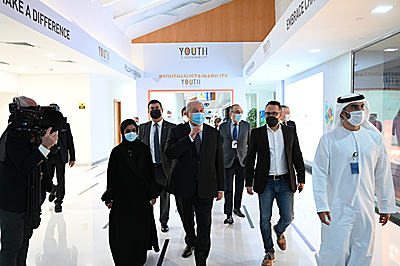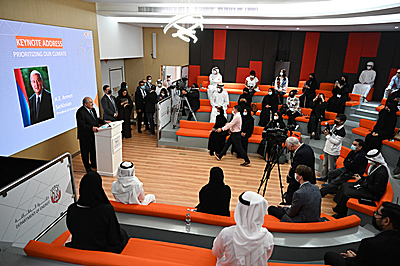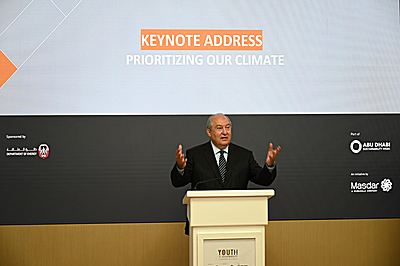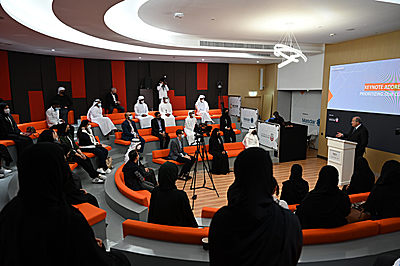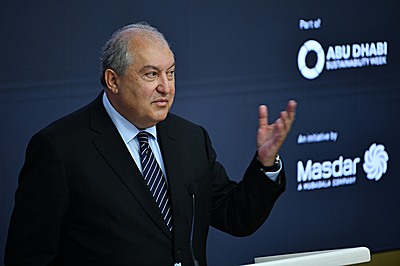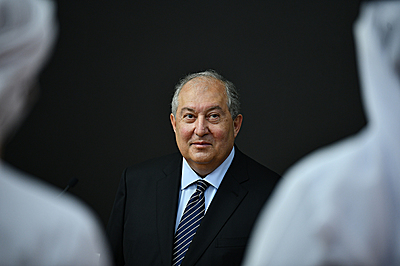Press releases
We must change our approaches, not technologies, to leave a predictable, sustainable and healthy world for generations. President Armen Sarkissian addressed the "Youth4Sustainability" conference
During his working visit to the United Arab Emirates, the President of the Republic of Armenia Armen Sarkissian delivered a keynote speech at the Youth4Sustainability conference within the framework of the prestigious Abu Dhabi Sustainability Week International Forum.
In his speech, President Sarkissian touched upon the rapid changes taking place in the modern world, the current challenges, and the importance of using technological developments for the benefit of the environment.
"After the first, second, third, and fourth industrial revolutions, I think there will not be a fifth, sixth, and seventh because we will live in a period of constant revolution, which I call a rapid revolution. It will be a revolution that will take place every month. New technological developments, and ideas, will be implemented so quickly that we will have a hard time keeping up, said President Sarkissian.- Changes and developments will occur daily. However, at the same time, we continue to emit toxic substances into the atmosphere, damaging not only the climate but also our environment. We are harming our environment by emitting chemicals and conducting nuclear tests. All this leads to various diseases. And here, we have what we have. We live in a world that not only has climate problems but also faces great challenges, in general.
This world has become unpredictable, and interconnected, where there is a sense of instability, and where populism is growing very fast. This is a world with many unanswered questions."
President Sarkissian attached significance to technologies and businesses and their adhering to greener behaviour in today's rapidly changing world. "One of the global problems is to protect the climate and environment. How do we solve this problem? We have some progress in this area, as many institutions, companies, and charities demonstrated their commitment to support fighting against climate change. But what is the final solution?
I think we will find a solution when the door to climate change opens for technologies. We have used technologies to harm the climate; the solution to the problem must be found through technologies. The solution will be found when the door to climate change opens for business; when businesses and industries make more profit by green behaviour. Business should be interested in causing as little harm to nature as possible. Worldwide, both in the public and private sectors, there are trillions of dollars available that can be invested in such businesses and, thus, address the challenges of climate change. That's the way to go.
I can present my idea I spoke about in Glasgow. We all live on the same planet, and does it matter where we plant a tree? When trees release oxygen, does it matter where it happens - in the Emirates, Qatar, Siberia or China? After all, oxygen is for the whole world. The same is true for harm. When we harm the climate here, it affects other countries.
There are many countries and organizations that emit CO2 but are willing to change that. Every change takes time. Our life 30, 40, 50 years ago, we can say, was all about coal, and later it was about burning oil. Today, it has become a little more gray as we have started using solar and wind energy, we burn more gas than oil. But our goal is to become green. It takes time and efforts to make the transition from black to green.
If Armenia is a small country, and it does not have big problems with the climate, there is a big country that burns coal, and needs time to convert it into solar energy. I tell that country, I owe you $100 million, I can offer to plant trees or do green business instead of repaying that money, so I can pay my debt.
The problem came forth as a result of great industrial and technological development, and the solution must be found through their application and open policy. First, we need to change our approaches, not the technologies and tools, how we treat the world, and our business, to leave a predictable, sustainable, and healthy world for our children.
Let us be very pragmatic in making this world sustainable.”
